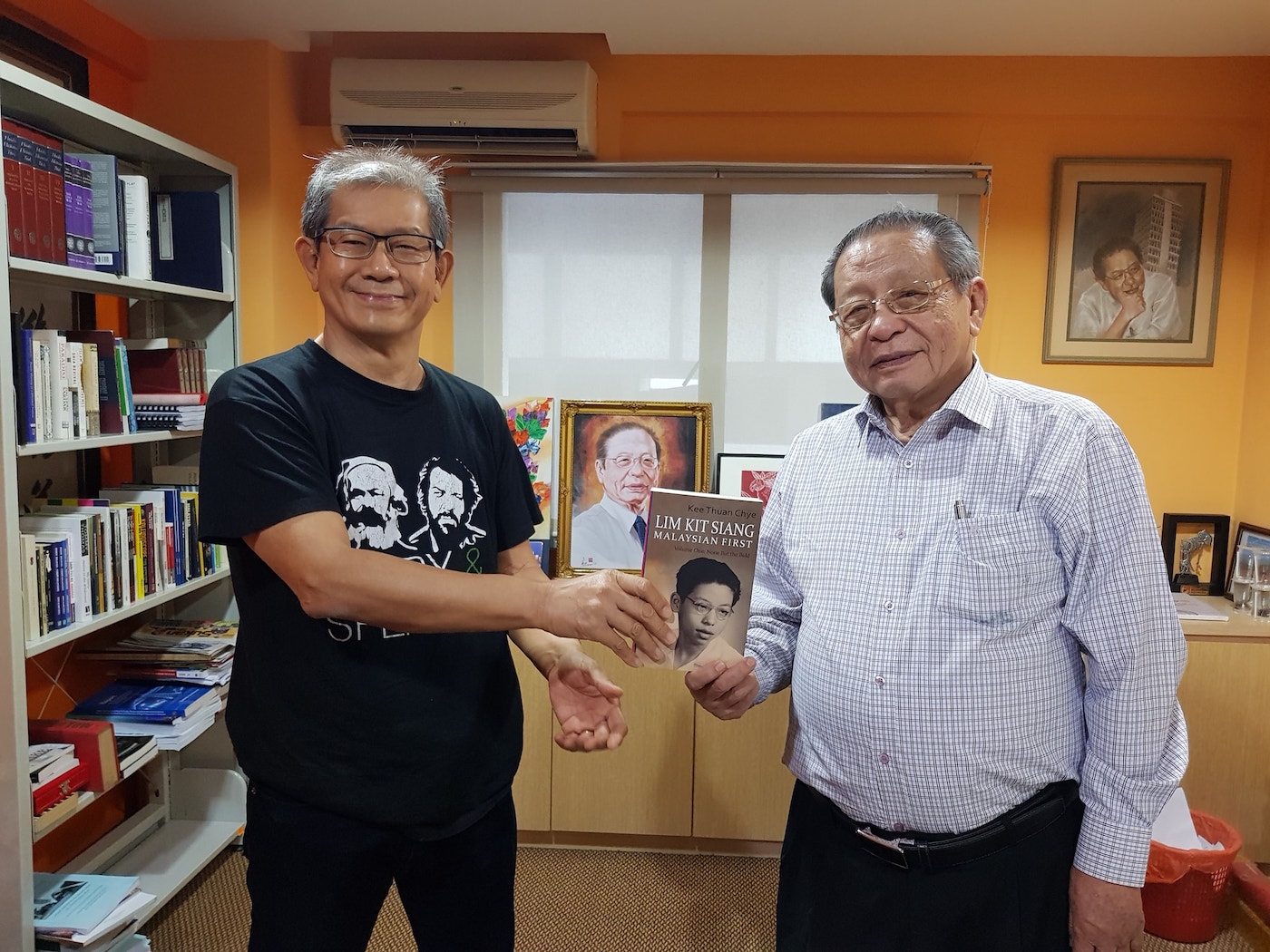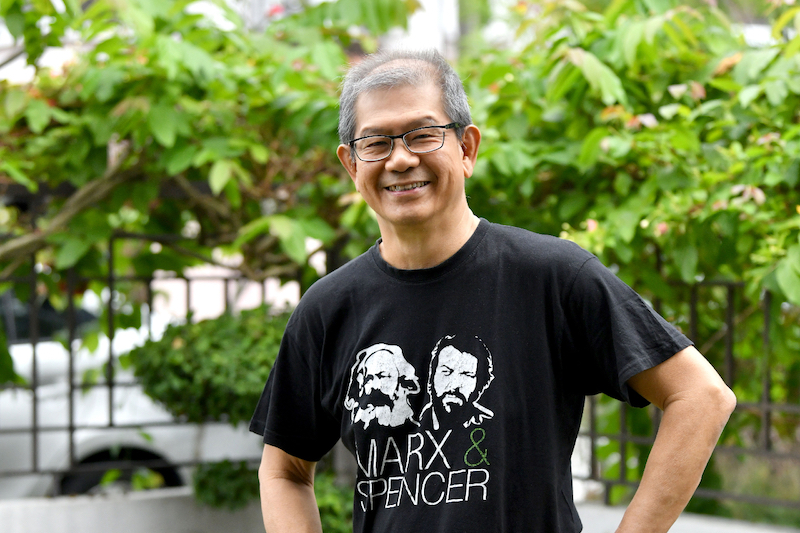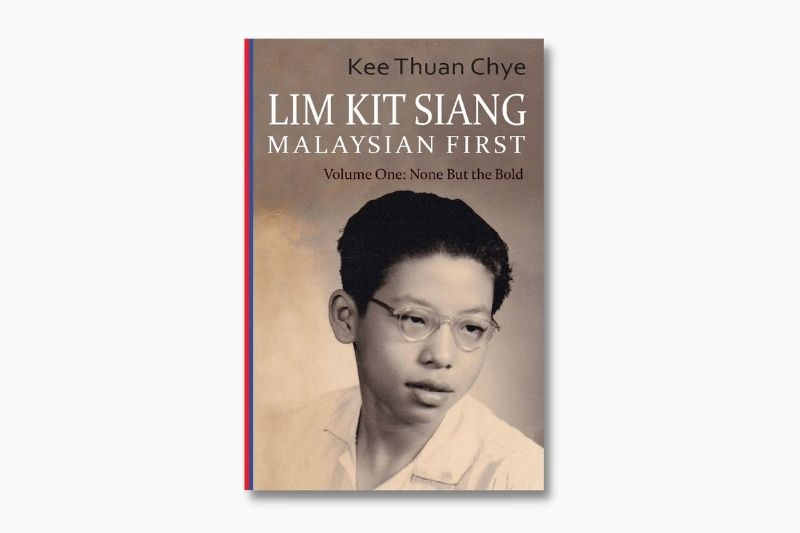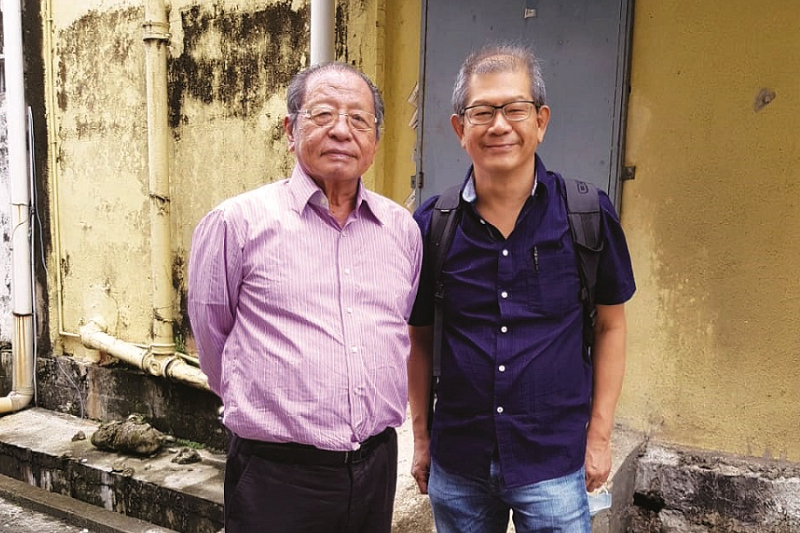
Kee Thuan Chye handing his book 'Malaysian First' to Lim Kit Siang (Photo: Kee Thuan Chye)
No one needs to ask Lim Kit Siang what he is first: His enduring pursuit of the Malaysian Dream is answer enough. It is a carry-over from when the Democratic Action Party (DAP) was formed in 1966 and the party campaigned for a “Malaysian Malaysia”. But, foremost, Lim had already envisioned a multiracial nation of equals in 1957, while at Batu Pahat High School, Johor. In an editorial for his class magazine, he expressed his view that the newly independent country should be one in which the people cooperated with one another, regardless of race or religion.
“Malaysian First aptly describes who Kit Siang is. He’s always dreaming about forging a multiracial, multi-religious, multicultural and multilingual nation where everybody can prosper together,” says Kee Thuan Chye, on the title of his two-volume biography on the DAP stalwart, a Member of Parliament for Iskandar Puteri. Vol One: None But the Bold, published in Singapore by Landmark Books, will be launched on Nov 9.
Kee had wanted to write about Lim for several years, as there was no full biography on him. He says: “He deserves it because of all he has gone through, and his sacrifices and ideas for the nation.
“I must emphasise that this is a totally independent project — it has nothing to do with DAP or Kit Siang. He does not dictate anything to me at all about the book. He does not even say what its content and form should be. Of course, if he did that, I would have told him off lah [laughs]. That’s the way we both like it. Kit Siang is also that sort of person — he never dictates things. And he has never asked to see anything.”
When Kee first broached the biography idea, Lim said he would think about it. When they met for dinner a few months later, the latter said, “Okay”. Kee did not ask more. “Some politicians suffer from verbal diarrhoea. He is not such a person. He is very terse, not the voluble sort.
ktc_1.jpeg

“Kit Siang himself tells me he is an introvert. He is not the sort who will just go out and talk to people and make as if they have been friends for a long time. He doesn’t talk very much, if you notice. He doesn’t go out to court attention.”
Not surprisingly, Lim also said his life was not interesting or exceptional.
“He was the first to admit that, apart from the fact that he was detained twice and fought a lot of things and went through a lot of hell, especially when his son Guan Eng [the Kota Melaka MP in 1994] was sent to prison over the Rahim Thamby Chik case [the then Melaka chief minister was alleged to have committed statutory rape on an underaged girl]. It was the worst time of Kit Siang’s life.”
Would he say Lim is the last clean politician standing?
“He’s been quite consistent. He was never in power. Even in 2008, he still didn’t have any position when DAP won Penang. His son became the chief minister, not he. He was still out there. After 2018, he didn’t want to have a ministerial post.
“Also, before 2008, DAP was always in the political wilderness. As an opposition party, the struggle is very hard. I have done the research and talked to people and can see for myself how difficult it was for them. They didn’t have money or resources. Sometimes, they even had to subsidise the operation by paying their own way. There were very few full-time positions in the party. They had to rely a lot on volunteers and, of course, donors.
“I don’t know if Kit Siang had any particular vice. He likes to drink but that’s not a vice. He didn’t have access to power in public office. He did not have temptations — people didn’t come to him for favours. So, he is probably not Machiavellian. Would he have been tempted? I don’t know … But I should say Kit Siang is not a materialistic person. His family home in Penang is a modest double-storey link house in Island Park.”
Integrity is key to Kee, who will not consider writing just anyone’s biography, even if he were offered lots of money. “If it’s going to be a politician, who else would have enough integrity for me to want to write about? I cannot simply go and write about a politician who is a crook, or is dishonest. Or if it’s somebody I know who has a sordid past or some criminal issue that has not been resolved. I wouldn’t want to soil my reputation for that.”
kee_thuan_chye_lim_kit_siang.jpg

He got down to work in January 2020, some months after Lim said to go ahead. As he did research, talked to people and started writing the initial chapters, he realised the book was going to be “massive”. It was inevitable, given its scope and the stature of his subject.
Lim, who turned 80 on Feb 20, was asked by C V Devan Nair, the first secretary-general of DAP and MP for Bangsar, Kuala Lumpur, to become his political secretary in 1965. Prior to that, he was a temporary English teacher at SJKC Senai, Johor, then worked as a journalist at the Straits Times, Singapore. In 1966, he was appointed DAP’s national organising secretary, a big role that had him going around the country to set up branches, among other things.
The book opens with Lim’s birth in 1941. It also covers when he stood for the general elections in May 1969 and his arrest three days after May 13 under the Internal Security Act. He was detained for 17 months. A second detention, in 1987 under the ISA during Operation Lalang, saw him locked up for 18 months. But there were other big moments, Kee writes, such as when Lim gave a three-hour presentation in Parliament in 1985 on the RM2.5 billion Bumiputra Malaysia Finance loans scandal, as well as “Save Bukit China” in Melaka, DAP’s most successful campaign.
Malaysian First goes behind the man in the public eye and into the domestic life of the “very private” Lim and his relationships with his parents, siblings, friends and party comrades. All these put together would have made a dauntingly thick book that would also take a long time to write. So, Kee decided to get Volume One done first and “create that interest, and also set down his life up to a certain point. It’s 400 pages and ends with a cliffhanger”.
He gathers Lim is a good family man despite his having to be away from home quite a lot and his periods of detention. “His four children had very good things to say about him and what they learnt from him. I also spoke to schoolmates who grew up with him; a few of them are still his closest friends to this day.”
Kee travelled to different states to talk to people, spending hours with each of them, even meeting some more than once. “I interviewed Musa Hitam twice. He said, ‘I normally don’t do interviews, but I am doing this for Kit Siang.’ This is Kit Siang’s former political opponent — Musa Hitam has high respect for him.”
There are people Kee wishes he could have spoken to, late party supremos who were very close to Lim, such as “firebrand” P Patto, “Tiger of Jelutong” Karpal Singh and “Cowboy” Hu Sepang. Founding member Dr Chen Man Hin, 97 next month, is another, but he is quite frail.
“I could have got a better picture in some cases with more input, more voices, more people talking about their experiences and, most importantly, sharing anecdotes. The book is full of anecdotes. There’s quite a bit of humour in it and sometimes I put in some cheeky asides.” For example, when writing about Guan Eng, Penang CM from March 2008 to May 2018, Kee asked Lim how special the birth of his firstborn was to him. “The world didn’t stop moving, he replied. That’s the kind of guy you are dealing with.”
A friend who accompanied Kee to dinner with Lim asked how the interviews were coming along and was told, “I feel victimised”.
“He’s actually a joker. His public persona is that of a serious, intense kind of guy. In person, he’s approachable and down to earth. And this is what I like — he has a dry sense of humour.”
Obtaining contacts, preparing questions, getting people to agree to meet and doing a bit of background check on them before travelling to different states for the interviews were part of a day’s work. There was information overload and Kee had to sieve through his recordings to pick out what was essential.
The actual interviews were quite fun, he found, because he was constantly trying to find the truth. Sometimes, he would pose the same question to someone when they met a few times, just to see how they answered.
“A lot of this work is searching for the truth. Sometimes, one person says something and it appears to be the truth. Then, you ask somebody else and there is a different perspective to it. You have to keep probing and asking, then decide what to include or leave out.
“I quote a lot of people. It’s important to do that because this is living history and they are the witnesses of history. It’s good that I have their testimonies, particularly those of Kit Siang’s old friends, as they would have known him very well from school days. One guy talked about how, in Form One, three of them cycled from Batu Pahat to Melaka.”
To make the biography more interesting, Kee presents facts using certain fictional techniques: To draw readers in, he set up scenes or rendered them in dialogue. An example is the time Devan Nair offered Lim the job of political secretary or when the Malaysian Chinese Association (MCA) held secret talks with DAP in 1971 on merging.
“As a biographer, you have the liberty to do that as long as you do not fabricate or lie. You still have to base everything on fact, on truth. But you can take the spirit of a discussion and imagine how they would have said it at that point.”
It helped that Lim gave him access to documents, photos and information, considering “he is a very careful person. He’s not the sort who will easily trust people”.
Why, then, did Lim trust him to write the biography? “He already knew about my writing and had read my articles. Some of them were actually reproduced on his blog,” says Kee, a dramatist, poet, journalist and an author of 15 books, including The People’s Victory: How Malaysians Saved Their Country; March 8: The Day Malaysia Woke Up; No More Bullshit, Please, We’re All Malaysians; 1984 Here and Now; The Big Purge; We Could **** You, Mr Birch; Just in So Many Words; and Old Doctors Never Fade Away, a biography.
Did Lim express any regrets?
“Of course not. This is his life, that’s why he cannot retire. And perhaps he shouldn’t. This is what he likes doing. This is what keeps him going and has motivated his whole life.
“Kit Siang was telling me he is now fighting what he calls his last battle, especially after the fall of the PH government. Of course, this is a continuing effort of his from time immemorial. But, he says, all the more so, this battle is important, urgent and difficult because when PH was in government, a lot of people expected too much change too quickly. And when it didn’t happen, they were disappointed.
“Now the task is to make people understand that you cannot bring about change overnight. Everybody wants to have a nation that is prosperous, where they can find a good living in. For us to achieve that, we must be able to come together and understand we need to work together. That is the thing Kit Siang will continue to pursue.”
The pandemic and two health issues in the last 1½ years derailed Kee’s plans to bring out Malaysian First in time for Lim’s 80th birthday, despite writing daily for months without a break. Lots more interviews are in line for Volume Two, as yet untitled and for which he will only say it opens in the period of the cliffhanger and ends in the present. He will start writing again soon and hopes to get it out by 2023.
Research, double-checking facts and meeting the deadline he set himself added to the stress of working on the biography. Still, “I came to enjoy writing the book as I went along because it was a challenge as well as a joy to tell a story with so much human interest inherent in it, in a manner that does justice to a story that is truly worth telling”.
Watch their exchange in an exclusive video interview below:
Malaysian First (RM80) is available at ubsm.com.my, MPH, Popular, and Kinokuniya.
This article first appeared on Oct 11, 2021 in The Edge Malaysia.



